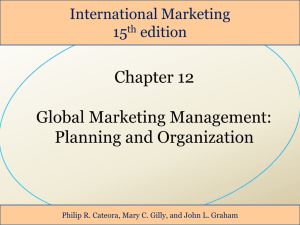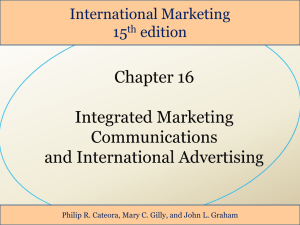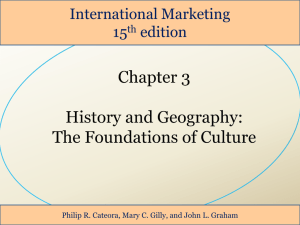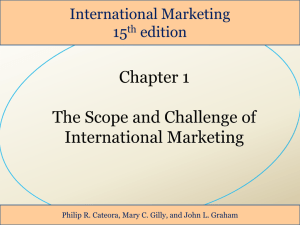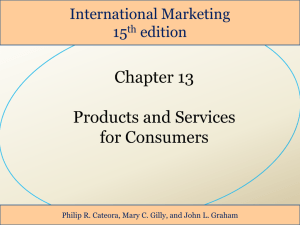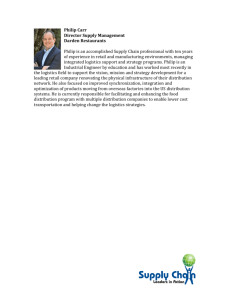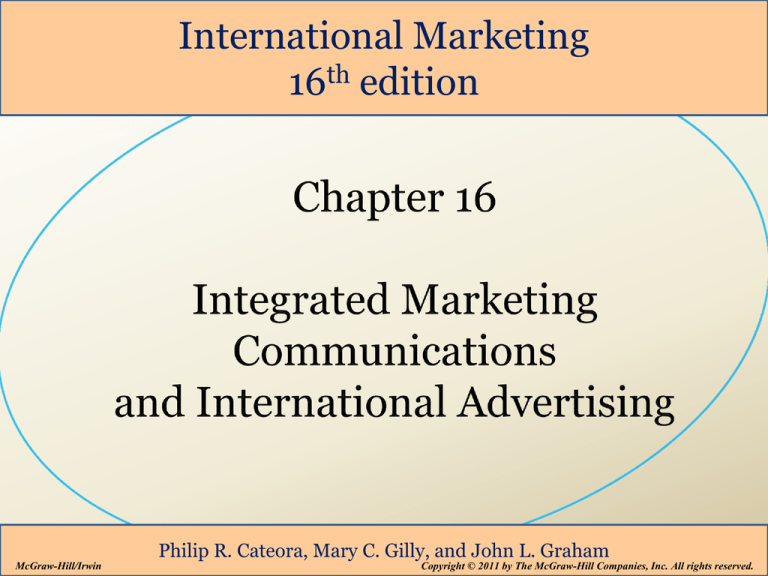
International Marketing
16th edition
Philip R. Cateora, Mary C. Gilly, and John L. Graham
McGraw-Hill/Irwin
Copyright © 2011 by The McGraw-Hill Companies, Inc. All rights reserved.
Introduction
• Integrated marketing communications (IMC) are
composed of advertising, sales promotions, trade shows,
personal selling, direct selling, and public relations
• All these mutually reinforcing elements of the marketing
mix have as their common objective the successful sale of
a product or service
• For most companies, advertising and personal selling are
the major components in the marketing communications
mix
• The goal of most companies, large and small, is to
achieve the synergies possible when sales promotions,
public relations efforts, and advertising are used in
concert
Roy Philip
16-2
Overview
•
•
•
•
•
•
•
•
Sales promotions in international markets
International public relations
International advertising
Advertising strategy and goals
The message: creative challenges
Media planning and analysis
Campaign executives and advertising agencies
International control of advertising: broader
issues
Roy Philip
16-3
Global Perspective
Barbie Versus Mulan
• Integrated marketing communications (IMC)
–
–
–
–
–
–
Advertising
Sales promotions
Trade shows
Personal selling
Direct selling
Public relations
• Objective: successful sale of a product or service
• Availability of appropriate communication
channels can determine entry decisions
Roy Philip
16-4
Sales Promotions
in International Markets
• Sales promotions
– Marketing activities that stimulate consumer
purchases and improve retailer or middlemen
effectiveness and cooperation
– Short-term efforts directed to the consumer or
retailer to achieve specific objectives
• In markets with media limitations the
percentage of the promotional budget allocated
to sales promotions may have to be increased
• Product sampling
Roy Philip
16-5
International
Public Relations
• Public relations (PR) is creating good relationships with the
popular press and other media
– To help companies communicate messages to customers,
the general public, and governmental regulators
• Bridgestone/Firestone Tires safety recall
• Global workplace standards
• Building an international profile
• Corporate sponsorships
Roy Philip
16-6
International Marketing
16th edition
McGraw-Hill/Irwin
Copyright © 2011 by The McGraw-Hill Companies, Inc. All rights reserved.
International Advertising
1. Perform marketing research
2. Specify the goals of the communication
3. Develop the most effective message(s) for the
market segments selected
4. Select effective media
5. Compose and secure a budget
6. Execute the campaign
7. Evaluate the campaign relative to the goals
specified
Roy Philip
16-8
Top 20 Global Advertisers
($ millions)
Exhibit 16.1
16-9
Top 20 Global Advertisers
($ millions)
Exhibit 16.1
Roy Philip
16-10
Top 100 Advertisers’ Global Spending
($ millions)
Exhibit 16.2
16-11
Top 100 Advertisers’ Global Spending
($ millions)
Exhibit 16.2
Roy Philip
16-12
Top Ten Advertisers
(Russia and China – $ millions)
Exhibit 16.3
(A) Russia
(B) China
16-13
Russia’s Top Ten Advertisers
($ millions)
Exhibit 16.3a
Roy Philip
16-14
China’s Top Ten Advertisers
($ millions)
Exhibit 16.3b
Roy Philip
16-15
Advertising Strategy and Goals
• Marketing problems
– Require careful marketing research
– Thoughtful and creative advertising campaigns
• In country, regional, and global markets
• Increased need for more sophisticated
advertising strategies
• Balance between standardization of advertising
themes and customization
• Consumer cultures
Roy Philip
16-16
International Marketing
16th edition
McGraw-Hill/Irwin
Copyright © 2011 by The McGraw-Hill Companies, Inc. All rights reserved.
Product Attributes
and Benefit Segmentation
• Different cultures usually agree on the benefit of the
primary function of a product or service
• Other features and psychological attributes of the
item can have significant differences
–
–
–
–
Cameras
Yogurt
Almonds
Waterbeds
• Blue Diamond
– Assumes that no two markets will react the same
• Each has its own set of differences
• Each will require a different marketing approach and
strategy
Roy Philip
16-18
Regional Segmentation
• Pan-European communications media highlights
need for more standardized promotional efforts
• Costs savings with a common theme in uniform
promotional packaging and design
• Legal restrictions slowly being eliminated
Roy Philip
16-19
Global Advertising
and the Communications Process
• If not properly considered, different cultural
contexts can increase the probability of
misunderstandings
• Effective communication
– Demands the existence of a “psychological
overlap” between the sender and the receiver
• It can never be assumed that “if it sells well in
one country, it will sell in another”
Roy Philip
16-20
International Marketing
16th edition
McGraw-Hill/Irwin
Copyright © 2011 by The McGraw-Hill Companies, Inc. All rights reserved.
Legal Constraints
Comparative advertising
Advertising of specific products
Control of advertising on television
Accessibility to broadcast media
Limitations on length and number of
commercials
• Internet services
• Special taxes that apply to advertising
•
•
•
•
•
Roy Philip
16-22
Linguistic Limitations
• Language is one of the major barriers to effective
communication through advertising
• Translation challenges
• Low literacy in many countries
• Multiple languages within a country
• In-country testing with the target consumer
group avoids problems caused by linguistic
differences
Roy Philip
16-23
Cultural Diversity
• Knowledge of cultural diversity must encompass
the total advertising project
• Existing perceptions based on tradition and
heritages are often hard to overcome
• Subcultures
• Changing traditions
Roy Philip
16-24
Media Limitations
and Production and Cost Limitations
• Media limitations may diminish the role of
advertising in the promotional program
• Examples of production limitations:
– Poor-quality printing
– Lack of high-grade paper
• Low-cost reproduction in small markets poses a
problem in many countries
Roy Philip
16-25
International Marketing
16th edition
McGraw-Hill/Irwin
Copyright © 2011 by The McGraw-Hill Companies, Inc. All rights reserved.
The International
Communications Process
Exhibit 16.4
Roy Philip
16-27
International Marketing
16th edition
McGraw-Hill/Irwin
Copyright © 2011 by The McGraw-Hill Companies, Inc. All rights reserved.
Media Planning and Analysis –
Tactical Considerations (1 of 2)
•
•
•
•
•
•
•
•
Availability
Cost
Coverage
Lack of market data
Newspapers
Magazines
Radio and television
Satellite and cable TV
Roy Philip
16-29
Media Planning and Analysis –
Tactical Considerations (2 of 2)
•
•
•
•
•
Direct mail
The Internet
Social Media
Mobile phone applications
Other media
Roy Philip
16-30
Media Penetration
in Selected Countries (% of households)
Exhibit 16.5
Roy Philip
16-31
Top Ten Websites
in Three Countries (visitors per month)
Exhibit 16.6
Roy Philip
16-32
Social Networking Goes Mobile
(% of Respondents)
Exhibit 16.7
Roy Philip
16-33
Social Media Users: Average Time Spent
on Social Media Networking Sites,
October 2009 (hours per user)
Exhibit 16.8
Roy Philip
16-34
Campaign Execution
and Advertising Agencies
• Managed by advertising agencies
– Local domestic agency
– Company-owned agency
– Multinational agency with local branches
• Compensation
– Commonly 15 percent throughout the world
– Some companies moving to reward-by-results
Roy Philip
16-35
World’s Top Ten
Advertising Agency Organizations
Exhibit 16.9
Roy Philip
16-36
International Control
of Advertising – Broader Issues
•
•
•
•
•
Consumer criticism
Deceptive advertising
Decency and blatant use of sex
Self-regulation
Government regulations
Roy Philip
16-37
Summary (1 of 2)
• An integrated marketing communications (IMC)
program includes coordination among
advertising, sales management, public relations,
sales promotions, and direct marketing
• Currently companies are basing their advertising
strategies on national, subcultural, demographic,
or other market segments
• The major problem facing international
advertisers is designing the best messages for
each market served
Roy Philip
16-38
Summary (2 of 2)
• The availability and quality of advertising media
vary substantially around the world
• Advances in communication technologies are
causing dramatic changes in the structure of the
international advertising and communications
industries
Roy Philip
16-39

